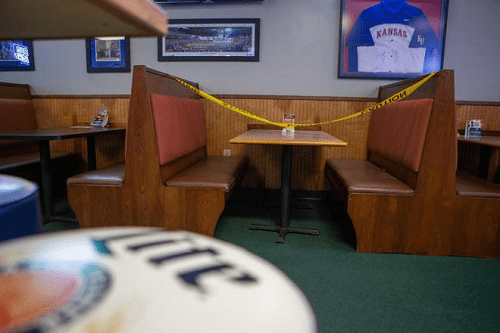
2.9.21 – Topeka Capital Journal –
Kansas businesses affected by COVID-19 restrictions might get property tax reimbursements. .
Businesses in Kansas and the U.S. have suffered during the pandemic, with countless businesses having closed, many of them permanently.
In particular, sectors where remote work wasn’t possible and where businesses weren’t deemed essential had an especially rough time, according to the National Bureau of Economic Research. One Kansas business even sued the state, seeking compensation for economic damages caused by the state’s COVID-19 shutdown.
Now, state lawmakers are now looking at targeting the government restrictions related to COVID-19 with a bill heard Tuesday that would give some property tax reimbursements to affected businesses.
“People were wondering if it was possible to give tax credits to businesses that shut down or businesses that were required to shut down,” Rep. Fred Patton, R-Topeka, said before the legislative session. “Were there any financial resources available from the state? So it’s something that we’ve at least conceptually looked at.”https://60511d6579eaafc5d46008a19e96573a.safeframe.googlesyndication.com/safeframe/1-0-37/html/container.html
Kansas House Bill 2142 is aimed at county restrictions specifically, many of which are still in effect in such places as Shawnee County. Any counties that had or still have business shutdown orders or capacity limitations would have to comply.
In short, business owners would be able to apply to the board of county commissioners for reimbursement of property taxes levied during that shutdown or limitation period.
For valid applications, the county from its general fund has to reimburse the owner one-twelfth the amount of the property tax value levied by the state, county and all taxing subdivisions due for the year, multiplied by the number of months in shutdown. For capacity limitations, it is that one-twelfth amount multiplied by the percentage of the capacity limitation multiplied by the number of months the limit was in effect.
Businesses affected by county virus restrictions after 2019 would be eligible under the bill.
Business groups came out in support of the bill, arguing that government bears some responsibility for forcing businesses to close.
“It’s something we identified as a need as we evaluated all the different state laws that created cliffs that many of our members unfortunately fell over,” said Scott Schneider of the Kansas Hospitality and Restaurant Association. Small businesses have been disproportionately hurt by government-mandated shutdowns and would greatly benefit, he added.
Schneider thought the bill could even be expanded to cover other areas, such as regulations beyond COVID-19 restrictions.
But a few lawmakers expressed concern that this was placing too much burden on counties. According to the bill’s fiscal note, the Kansas Association of Counties said county governments retain only 30% of all property taxes collected in the state.
“I agree that these businesses have been severely impacted. The problem is the way the bill is written to get that money out of the county general fund — where do counties get the money?” said Rep. Adam Smith, R-Weskan. “It’s not their money. It’s taxpayer money. So are we in a way imposing a tax increase, whether it’s through sales tax or property tax? These counties are going to need to replenish that general fund should this bill pass.”
Rep. Dave Baker, R-Council Grove, added that counties would have an extremely difficult time getting that money back with less tax revenue in the future as a result of more business closures caused by the pandemic.
Jay Hall from KAC further noted that the bill is too broad, as counties may impose shutdowns or capacity limits for reasons beyond the pandemic, such as individual code violations. He also said it would negatively affect critical services.
“If the budget is reduced in any significant capacity, mandatory services would need to be cut to balance the budget, as required by Kansas law,” Hall said. “This is especially true if reimbursements were to be paid out in 2021, when counties have had no opportunity to budget for this fiscal impact.”
Property taxes don’t make up a significant proportion of revenue for businesses, some pointed out. But restaurant owners who testified said every dollar mattered as they are trying to survive on razor-thin margins.
Lawmakers also wanted to make sure the savings would go to the right hands, not to out-of-state developers. There was also inquiries about how the bill could be reformatted to address businesses renting space from landlords.
Details of the bill still need to be worked out further to address all those concerns.
Rep. Clarke Sanders, R-Salina, asked if the state should also bear some blame. Schneider implied this was probably directed at counties because new emergency management laws allowed counties now to opt out of the governor’s orders, but he was game for compensation from the state.
On that note, more legislation allowing for more tax credits for businesses hurt by the pandemic is currently in the works as well.
